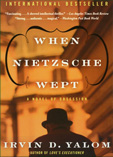Irvin Yalom writes books about men finding redemption through therapy, and for him the therapeutic encounter is always a two-way thing, in which the healer and the patient take turns on each other's therapeutic couches.
Friedrich Nietzsche thinks that he is receiving treatment for his physical ailments (and he is) but his physician Josef Breuer has been briefed by a concerned former friend of Nietzsche's (Lou Salomé) to treat his 'suicidal thoughts' at the same time. Nietzsche would never agree to be counselled and is on the point of leaving when Breuer proposes an exchange: Nietzsche will give philosophical counselling to Breuer, while Breuer attempts to smuggle a psychiatric treatment beneath his physical treatment of Nietzsche.
Breuer is a successful physician who has married well, but he feels like his life has been chosen for him, that he has never truly chosen it. His mind is invaded by angst, and by dangerous sexual urges towards his ex-patient Bertha Pappenheim which, if acted upon, would bring ruin to his family. Nietzsche is the philosopher who teaches how to 'philosophise with a hammer', to sound out idols with a tuning fork in order to hear their hollow sound. His philosophy is esteemed for its lightning insights and delicate evaluations, for its multiplicity and perspectivism, and for the extreme self-awareness of its author, who nevertheless has a fairly large blind-spot with regard to women. Having recently emerged from a love-triangle involving his best friend and a Russian woman named Lou Salomé, Nietzsche's views about 'woman' (as he calls them) are more abhorrent than ever, and he shares them freely with Breuer, whilst refraining from mentioning specifics.
This is by no means a feminist novel and the women in the book are little more than canvasses onto which the men in the book project their desires. Even the impressive Lou Salomé, the most fully realised female character, only appears in a few scenes. The protagonists' tastes in women are intended to be reflective of their characters: Breuer likes soft, nice things and his wife Mathilde is constantly compared to the beautiful pastries covered in schlag that she cooks for her husband. Bertha, the psychologically-damaged patient with whom Breuer is infatuated, is a warm, malleable piece of dough, which Breuer can fix into a form temporarily before having to 'knead' all over again. Lou Salomé is a strong and independent woman whose mind feels as malleable to Nietzsche as the soft flesh of Bertha is to Breuer, but she is no less reducible to the 19th century's customary categories for talking about women ("predator clothed as house-pet," "revengeful-lustful schoolgirl," etc.) when their brief friendship reaches its end.
Both men hold the women in their lives responsible for their problems — Breuer blames Mathilde for his complacency and fear of ageing, while Nietzsche blames Lou for his depression and suicidal thoughts. What the healing salve of existential therapy teaches them is that the women are not blameworthy at all, that men and women were just "fill-in performers in each other's obsessive drama" who never truly saw each other. Nietzsche, wedded to hardness and bitter isolation, learns to open up and express his emotions; Breuer, hemmed in by complacency, experiments with the solitary life and decides to choose the life he already has.
Nietzsche and Breuer learn to 'become who they are' by experiencing themselves as multiple in order to choose their own fates. Being able to see themselves as multiple allows them to begin to see other people (i.e. women) as multiple too, with all the strengths and frailties and problems that they have. Nietzsche did not progress very far down this road: his continuing attachment to the crudest categories of misogyny (Zarathustra, the next book he wrote, contains the famous line: "Are you visiting woman? Do not forget your whip!") proved that however far his self-knowledge had progressed, he remained in some respects only human, all-too-human.

